If there’s any topic that has impacted my life so deeply – and yet I’ve been putting off writing for over ten years – it’s religious trauma.
The topic of religious trauma is such an inflammatory topic, and one that has harmed so many people, that I’m going to try and approach it as delicately as I can.
Religious trauma is pervasive and more widespread than I believe most people are aware of. After all, the foundation of most modern societies are based on religious ideals, whether you live in the east or west.

Soul Work Compass Course:
Feeling lost or disconnected? The Soul Work Compass guides you through a 12-lesson alchemical journey to transform emptiness into clarity and deep self-insight. Create your personal compass to navigate life with clarity, freedom, and soul-aligned direction. Start your Great Work today!
So to get this out of the way before I begin:
Do I think all religion is evil? Am I an anti-theist? No. Religion serves a valuable function in society by emphasizing social connectedness, support, values, and higher ideals. For many people, religion is what makes life worth living, and it has helped them in their darkest times.
Do I believe all religious people are horrible? No. In fact, many religious people are some of the kindest and most generous souls you’ll ever meet.
Do I “hate” Christianity? (The religion I was brought up in.) No, I don’t hate Christianity. I can see the value in this belief system, and I respect and admire figures such as Jesus, Mary Magdalene, and the Virgin Mary (who I still feel an affinity with).
But here’s the thing:
Religion, with all of its underlying value, can easily become something destructive, abusive, perverted, and traumatizing.
In this article, I’m going to explore the dark side of religion as a religious trauma survivor, and also how to heal these wounds from a deeper perspective.
Want to get LonerWolf at the top of your Google search results?
Please note: In the interests of keeping this a safe space, and to respect my own personal boundaries, any comments deemed abusive, harmful, or proselytizing will be removed. Thank you for respecting the healing journeys of others.
Also, this article is written from an ex-Christian perspective, but it applies to anyone from any religion. If your unique experiences of religious trauma aren’t mentioned here, I apologize – they are just as valid. I can only write from what I have personally experienced.
Trigger warning: This article contains mention of sexual abuse, murder-suicide, self-harm, suicidal ideation, physical abuse, and other triggering topics. Proceed with caution.
In the interests of being trauma-sensitive, if at any point you feel overwhelmed by reading this article, please stop, take a break, and return to this page later (you can always bookmark it). And be sure to share this article with anyone who you feel might benefit.
Table of contents
What is Religious Trauma?
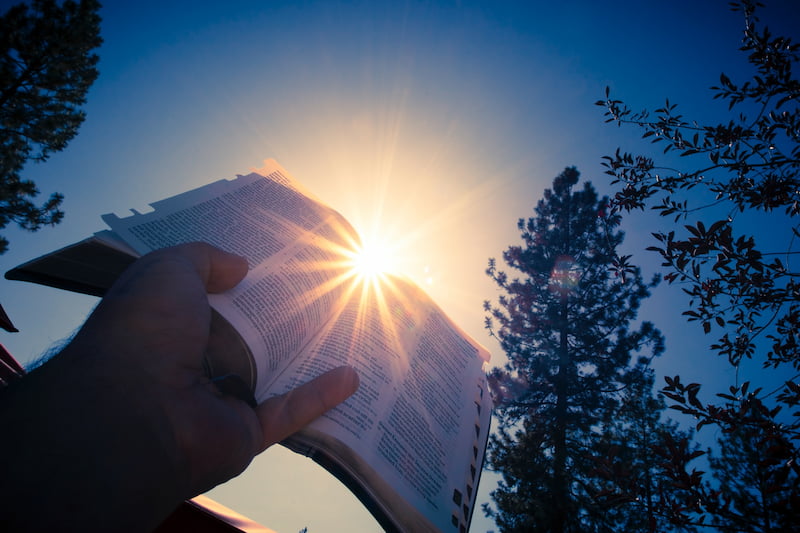
Religious trauma refers to the deeply felt ongoing mental and emotional suffering one experiences at the hands of a religious belief system. Experiencing religious trauma can happen to anyone of any faith at any point in their lives – and it can be cumulative or sudden. In other words, religious trauma can slowly build through a person’s faith journey or it can occur as a sudden shock such as through a public display of humiliation, sexual abuse, or another unexpected painful incident.
My Experience With Religious Trauma
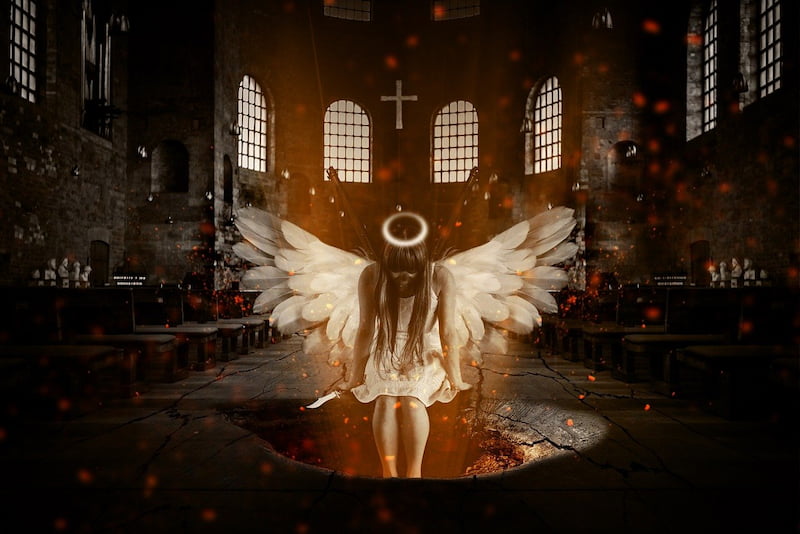
Religious trauma for me was a cumulative experience that reached its peak at the age of 19 when I decided to finally cut ties with the fundamentalist religion of my childhood (and unfortunately my blood family alongside it).
Since birth, I was raised in a fundamentalist Christian church known as the Church of Christ who prided themselves on a strict adherence to biblical tenets. I was taught that the CoC was the “one true church,” that those who belonged to it were “special and chosen,” and that all other beliefs (including other Christian denominations) and belief systems were false – and that those believing in them would end up burning in hell for all eternity.
I was indoctrinated with purity culture ideals of staying a virgin until marriage – that a woman wasn’t allowed to speak in church, couldn’t be a leader or “elder,” or do anything other than be a good homemaker and “submit” to her husband. I wasn’t permitted to cut my hair, celebrate Christmas or Easter (or any other “non-biblical” holidays), or be overly “worldly” because I was taught to believe that “Satan prowls around like a roaring lion looking for someone to devour.”
Imagine being taught, as a tiny little girl, that not only is the Devil always out to try and get you, but that if you’re “bad” in any way, you’ll suffer for all eternity in hellfire in the worst possible agony you could ever imagine? That’s a pretty fucked up thing to teach a young child.
Being indoctrinated at a very young age, for almost two decades with paranoid, bigoted, and fear-based beliefs about the world, it was no wonder that my mental health took a nosedive in my later adolescence. When I began to question why an “all-loving God” would send people to burn in hell forever if they didn’t “follow what He wanted,” my world began to crack apart. Just like in The Truman Show, my whole understanding of reality began to collapse and crumble beneath me. Reading the Bible three times over didn’t solve any of my problems either – it made the situation worse.
Would you like to save this?
Your information will never be shared.
I remember sitting in church during a sermon one Sunday, feeling the deeply disturbing sensation that my soul was slowly dying. Sudden thoughts of murder-suicide would flash through my fragmented mind as disturbing bloody images of stabbing the preacher over and over again – and then killing myself – would burst into my awareness. (I later learned that these thoughts signalled the emergence of my heavily repressed and rejected Shadow Self.)
This drive toward self-harm and suicidal-ideation began as a teenager and continued until a little after I left the religion, but thankfully it never resulted in anything serious.
There’s a lot more that I could share about enduring physical abuse (aka., “biblical” punishment) with a horse whip, spiritual gaslighting, emotional manipulation, social isolation, learning that my favorite Christian friend was a child molester, and the other nuances of an immature and destructive belief system – but I’ll try to keep this simple.
I don’t blame my parents because I know that they were trying to do the best they could with the level of awareness they had. They’re good people deep down with admirable qualities. I’m sure religion felt like a soothing balm for them and they wanted to instil some kind of values into their children. My childhood wasn’t all bad and there were certainly good parts, and wonderful qualities my parents instilled into me (like creativity and a good work ethic). But religion for me was a horror show that I’m still overcoming to this very day.
Unfortunately, the result of freeing myself from this religious trauma, also meant that I had to become a black sheep and cut ties with my blood family, who were conditioned by their beliefs to see me as a “heathen,” “traitor to the faith,” “sinner,” and so on.
I didn’t leave in a perfect way. I wish I had said goodbye to my siblings early on that morning I grabbed my bags and left. I wish I could have been there to support my little sister and meet my third sister who was born a few years after I left. But returning to that environment would mean deep self-betrayal, threatening my mental, emotional, and spiritual sanity. Exposing myself to the very situation that caused such deep trauma in me to begin with is not something I’m willing to do again.
My story is certainly not the worst out there – there are so many others who have experienced far worse than I have. And while I am a victim, I refuse to stay as one. I’m a survivor and now a thriver. And this deep pain is perhaps the main reason why I’m drawn to the symbol of the wolf, writing for and running this website, and exploring the shadows that obscure our Inner Light.
Religion vs. Spirituality
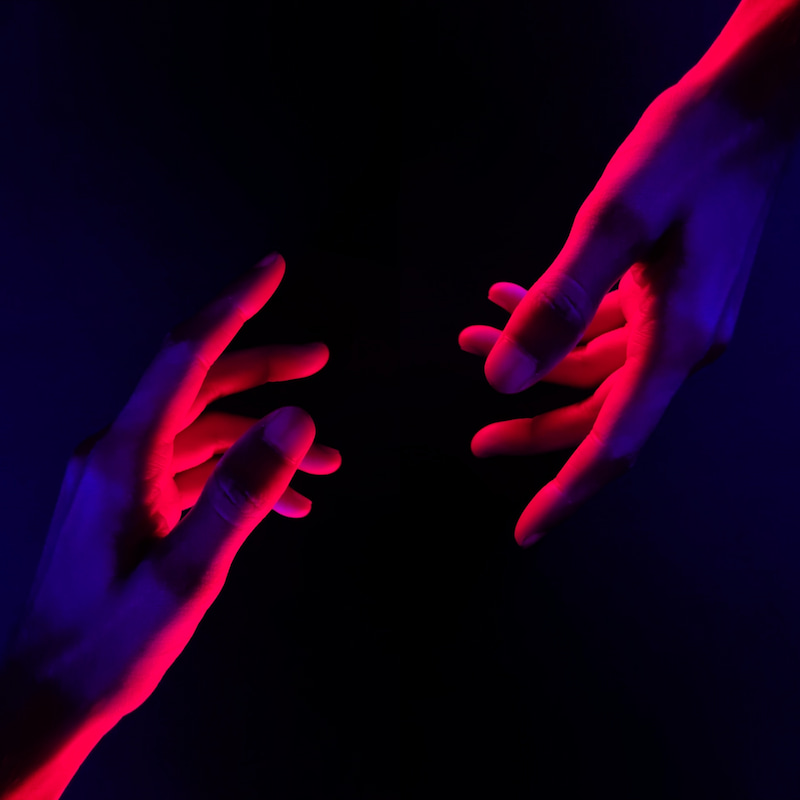
I just want to quickly clarify that this article is focused on religious trauma, not spiritual trauma. Religion and spirituality are two different paths. Here’s the difference, which I define in my article entitled Spirituality vs Religion:
Spirituality is connecting to the Divine through your own personal experience. It is primarily concerned with finding, experiencing, and embodying one’s true spiritual nature.
Religion is connecting to the Divine through someone else’s experience. It is primarily concerned with believing in, following, and obeying the rules created by a certain Deity or spiritual teacher.
If you think you fit into the spiritual definition more than the religious one, and you’re wanting to look more into spiritual abuse specifically, I recommend checking out the following articles:
- What Is Spiritual Bypassing? (Beware of These 10 Types)
- 15 Toxic Signs of a Spiritual Narcissist
- 11 Deceptive Spiritual Traps Sabotaging Your Growth
23 Signs You’re Experiencing Religious Trauma
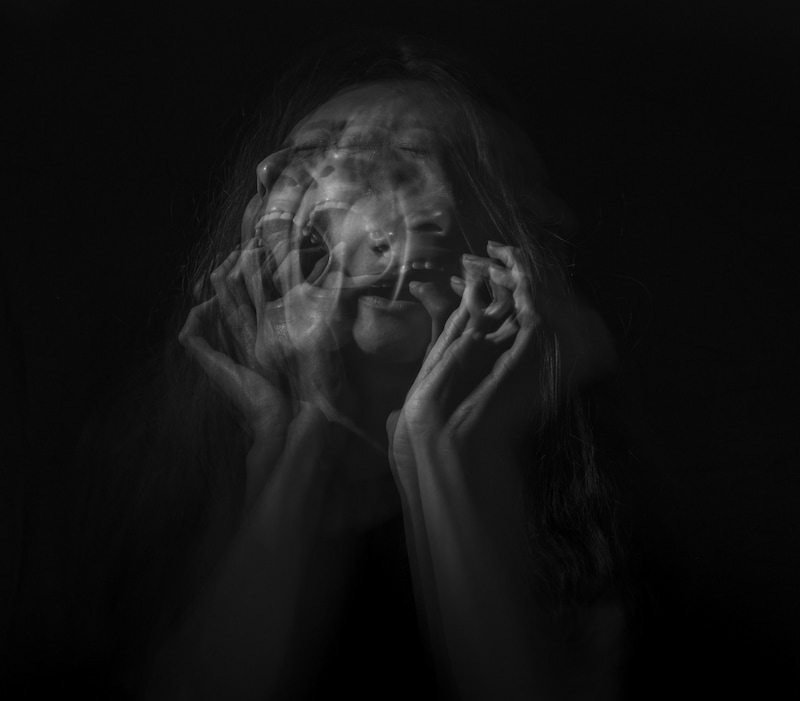
How do you know whether you’re experiencing religious trauma? Most likely, you’ll need to self-diagnose as this term isn’t listed in the DSM-5 (which is not saying that listing it as a mental disorder is actually always that helpful).
Trust in your own experience. These signs aren’t meant to “diagnose” you in any way (as I’m not a psychologist or mental health professional). But if you can relate to some of them, chances are that you do indeed suffer from religious trauma:
- Chronic feelings of unworthiness and inadequacy
- Persistent anxiety or panic
- Existential depression or melancholy
- Self-hatred or self-loathing
- Perfectionism
- Obsessive compulsive tendencies
- Weak sense of self
- Poor personal boundaries
- Nightmares or sleep disturbance
- Diminished social connections and loss of community
- Difficulty maintaining friendships, relationships, etc.
- Sexual dysfunction (excessive or under active sex drive)
- Persistent loneliness and feelings of abandonment
- Strong addictive tendencies
- Fear of experiencing joy or pleasure
- Difficulty with self-expression and speaking up
- Intrusive thoughts
- Rigid black-or-white thinking and troubles accepting alternative viewpoints
- Hypervigilance and feeling like one is being constantly watched and judged
- Inability to trust oneself and one’s gut instincts
- Difficulty trusting in other people and the Divine
- Struggles with being self-autonomous and making decisions
- Deep-seated feelings of shame and guilt about normal thoughts, feelings, and behaviors
This isn’t an exhaustive list of religious trauma signs, and if any others come up for you that aren’t listed, trust that they’re just as relevant as what I’ve shared above.
Examples of Religious Abuse
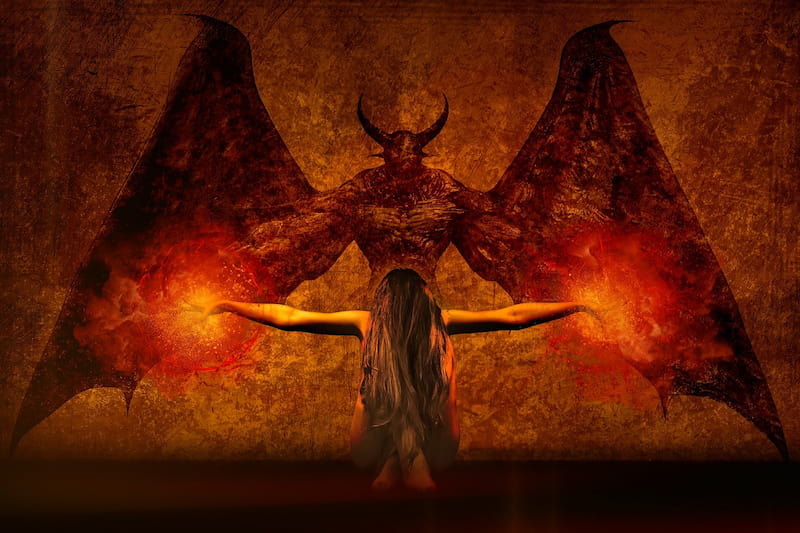
What about specific examples of religious abuse?
As I said at the start of this article, religious abuse can be both cumulative (aka., happen over a long period of time and in subtle/overt ways) or be sudden (due to a specific incident).
The examples of religious abuse below don’t cover all of the nuances of this complex beast, but I hope they give you a clearer idea of how religious abuse can appear:
For over 12 years, we've poured our hearts into creating free content on this website. Unlike many platforms, we believe this guidance should be accessible to everyone. If this post empowered you in any way, please consider making a donation to keep us going. Any amount (one-time or ongoing) makes a huge difference.
- A woman is shamed for dressing a certain way and told that she’s sinning against God for displaying her body.
- A man is judged and ostracized by his religious community for his attraction toward other men.
- A family cuts off their child when the child leaves the religion.
- A person seeks help from their religious elders about marital abuse, only to be told that it’s their lack of faith that is the problem, not the other party’s sexual/physical/emotional abuse.
- A child is physically, mentally, or emotionally punished for doing or saying something that is perceived to be against the parent’s beliefs.
- A religious community pressures and coerces an older person to donate more money than they can afford to give to their evangelical efforts.
- A charismatic religious leader uses his/her position of power to gain sexual favors in the name of “God.”
- A person is publicly humiliated for a perceived “sin.”
- A child is raped and the parents and religious authorities don’t believe his or her word, pretending it didn’t happen.
- A person is emotionally blackmailed and gaslighted into questioning their sanity when bringing up reasonable questions about certain religious beliefs.
- A mother experiences control and intimidation tactics when she stops exposing her children to a belief system.
- A father’s mental health problems are minimized or ridiculed by religious leaders, and he undergoes inadequate treatment from an incompetent “religious counselor.”
- A religious leader uses scripture to justify sexist, homophobic, transphobic, racist, ableist, or otherwise violent and destructive viewpoints.
Can you think of any more examples? If so, share them in the comments!
Religious Trauma and Spiritual Awakening
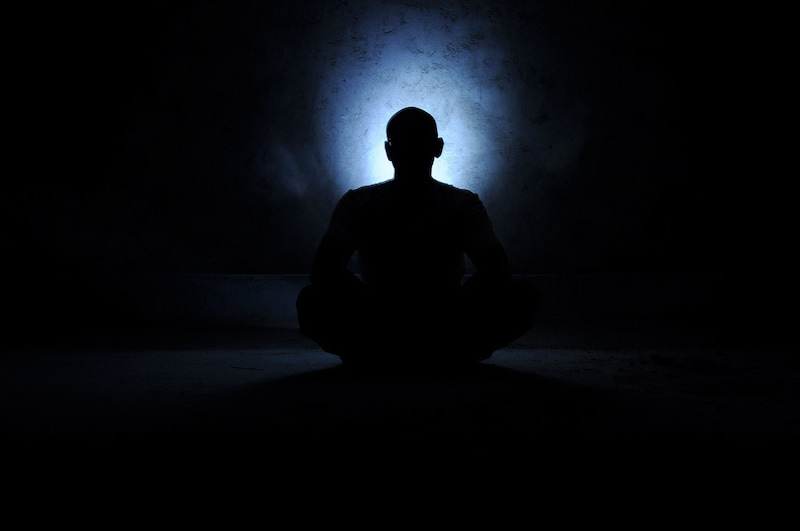
Going through religious trauma is what led to my own Dark Night of the Soul and subsequent spiritual awakening – and if you’re going through this experience, you might be called to the same path as well.
Spiritual awakening is what happens when we begin questioning our beliefs, habits, social conditioning, and everything that feels fake or false in our lives. A deep hunger and longing begins to burn within us to find truth, freedom, relief from suffering, and inner peace. We may crave to find what the meaning of life is, what our purpose is, and ultimately, who we truly are on a primordial level (our True Nature).
In other words, spiritual awakening emerges as a deep inner call from the Soul, demanding that we “wake up,” walk our own paths, and listen to our Soul’s calling to find Home.
Not everyone is ready for or interested in spirituality after going through the horrible roller coaster of religious trauma. In fact, many people feel drawn to atheism, and that’s fine. Sometimes atheism is the most healing and empowering path for a person.
But if you’re like me and you feel a calling from the Soul to find truth, freedom, and love, pay attention. Listen to and trust that inner call.
I recommend that you see the free Spiritual Awakening course we’ve created which can help to offer some grounded support and guidance during this tender and painful part of your life. You can also see my Soul searching article for more insight.
How to Heal From Religious Trauma

Healing from religious trauma is a process. I’m not going to give you some kind of gimmicky “7-steps-to-healing” shit because that’s not how it works.
Healing takes time, experimentation, vulnerability … and again, time.
What I offer below isn’t meant to be a map, just some helpful practices that have supported me in my own journey of healing religious trauma. Am I completely healed? No. I’m still healing to this very day. But I’ve learned a hell of a lot across the past decade. And I want to share that with you now:
(i) Journaling – simple but powerful
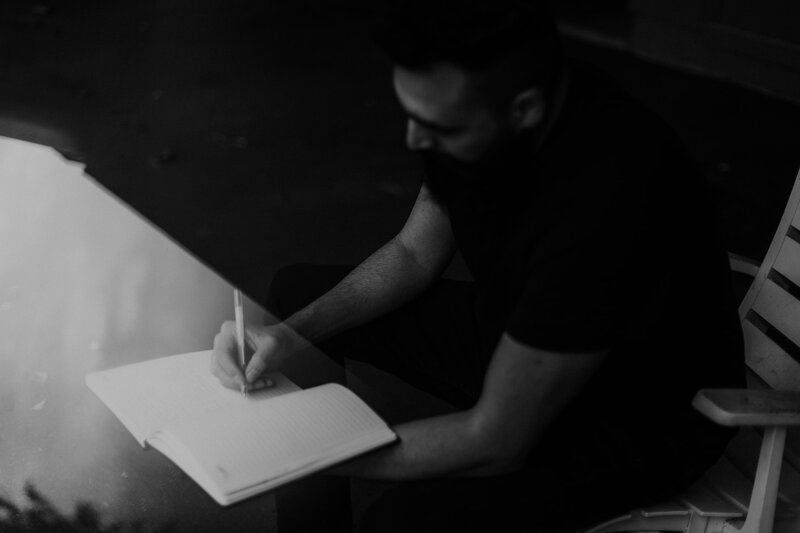
Undergoing religious trauma can be a lonely and isolating experience. Most people can’t understand or appreciate the intensity and complexity of how deeply harmful and disturbing to the psyche toxic religious conditioning can be.
One practice that helped me to keep some semblance of sanity during the darker parts of my religious journey was journaling. When I journaled, it felt like I was having a conversation with someone who actually understood what I was feeling – me.
There is a healthy and unhealthy way of journaling (aka., constructive vs. destructive), so be sure to read my article on How to Journal to learn how to journal in a beneficial way.
You can also check out this guided Self-Love Journal that I co-created a little while back, if you want some structured help.
(ii) Mindfulness and self-compassion
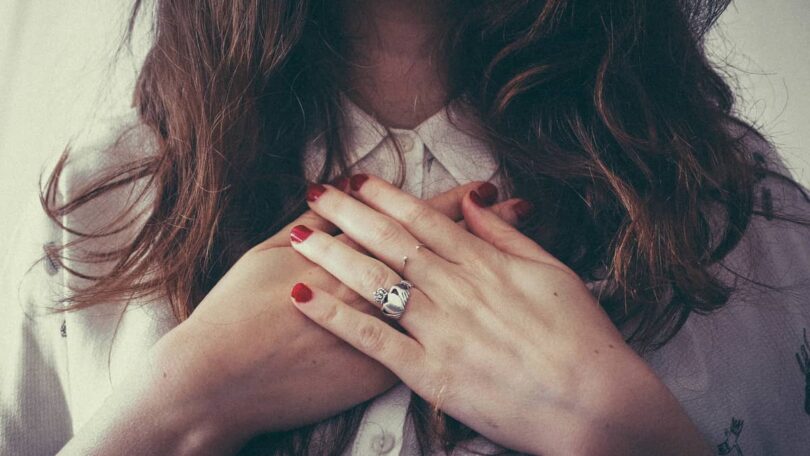
Mindfulness helps you to learn how to live in the present moment (instead of getting lost in thoughts about the past or future). And self-compassion helps you to learn how to be gentle, kind, and forgiving with yourself.
Self-compassion eventually leads into compassion for others, which is why it’s such a beautiful and healing practice.
The Self-Love Journal I mentioned above can help you develop more self-compassion. Otherwise, you can also check out the following resources:
- Self-Compassion: 9 Ways to Heal Your Deepest Wounds
- Self-Love: 23 Ways to Become a Doctor of the Soul
(iii) Spend lots of time in nature

Being in and amongst nature was the second practice that helped me tremendously when I was in the thick of religion and feeling slowly suffocated. Nature has helped me ever since.
The power of nature lies in how free, flowing, spontaneous, and open it is – qualities that, incidentally, mirror our Higher Self or True Nature (because in reality, we are nature).
Nature also teaches us in innumerable ways about the cycles of birth and death, light and darkness, and the essential non-dual nature of reality.
Researches on the benefits of time spent in nature have called this practice ecotherapy. So be sure to spend time watching, walking in, climbing, or engaging in nature in whatever way feels most enjoyable to you.
(iv) Make friends with your inner child
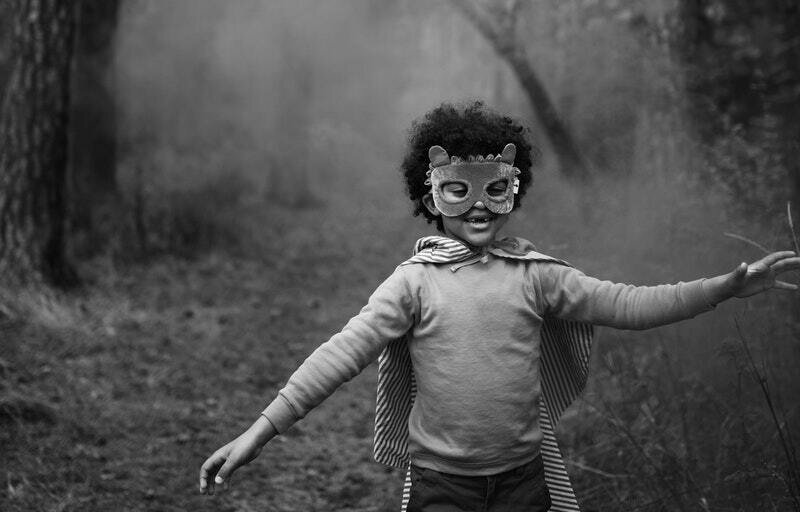
Before making friends with your inner child, I always recommend gaining some level of healthy self-worth because inner child work is an extremely tender and vulnerable practice. If you go into this practice hating yourself, your inner child will never feel safe enough to come out and be embraced. So remember, self-love precedes inner child work.
With that said, working with my inner child was (and is still) one of the most nourishing ways of reclaiming a sense of creativity, joy, adventure, and even long lost wisdom.
Your inner child carries so much love and potential, and s/he is a crucial part of you. But at the same time, your inner child also carries so much unprocessed pain. And when it comes to religious trauma, chances are that your inner child was the one that copped the most suffering.
I recommend working with a trained trauma-informed therapist when learning how to heal your inner child – that helped me greatly. Journaling and mirror work also supported my journey of working with and reclaiming my inner child.
You can see the Inner Child Journal that I’ve co-authored if you’d like some support with this deep work (feel free to use it alongside therapy as well).
(v) Mindful shadow work
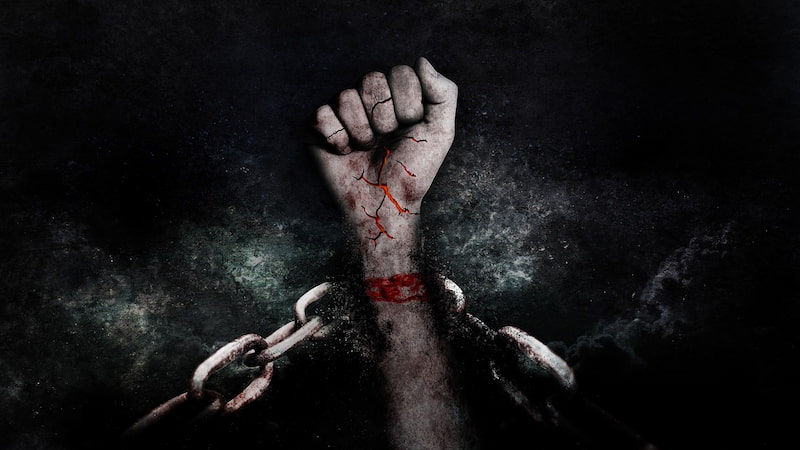
There are three main forms of inner work that I write about on this website, and they are:
- Self-Love
- Inner Child Work
- Shadow Work
Self-love comes first, then inner child work, and finally shadow work. So the same warning applies to shadow work as with inner child work: pleasure ensure that you have a stable sense of self-esteem before you embark on this work. Loathing yourself and then deciding to explore your shadows (or dark side) is a recipe for disaster and retraumatization. So take heed and proceed slowly and mindfully.
Shadow work is the practice of exploring anything that obscures your inner Light – that could be false beliefs, core wounds, old programs, lost inner parts, or any part of you that feels contracted or blocked.
What is so vital and powerful about shadow work is that it can help us at any point of our life journeys. No matter what degree of awakening we’ve experienced, we always need to be mindful of our shadows because the reality is that we are both human (aka., imperfect) and divine.
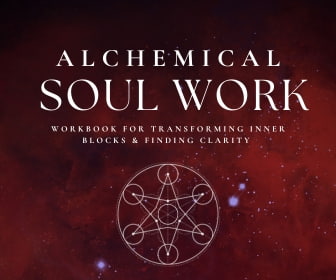
Stuck in the same old story?
Write a new one. The Alchemical Soul Work Workbook empowers you to become the alchemist of your own life. It provides the tools to dissolve old narratives and transform pain into power, giving you the freedom to create a future that is authentically yours.
If you’d like to explore shadow work, I recommend checking out our highly rated Shadow Work Journal.
(vi) Internal family systems – or working with your inner parts

Internal family systems (IFS) is a form of psychotherapy which I love and highly recommend to those experiencing religious trauma.
IFS works on the premise that we are all composed of many different parts – happy, sad, angry, joyful, creative, sad, childlike, wise, and silly parts (and so on). At the center of our being is a wise and compassionate inner force known as the Self (capital ‘s’), which I love because it’s a form of therapy that welcomes the spiritual into the picture alongside psychological elements.
You can read more about IFS in my Internal Family Systems article. I also recommend looking into getting an IFS therapist if you’d like to go deeper into this work.
(vii) Non-duality – or seeing through the separate self
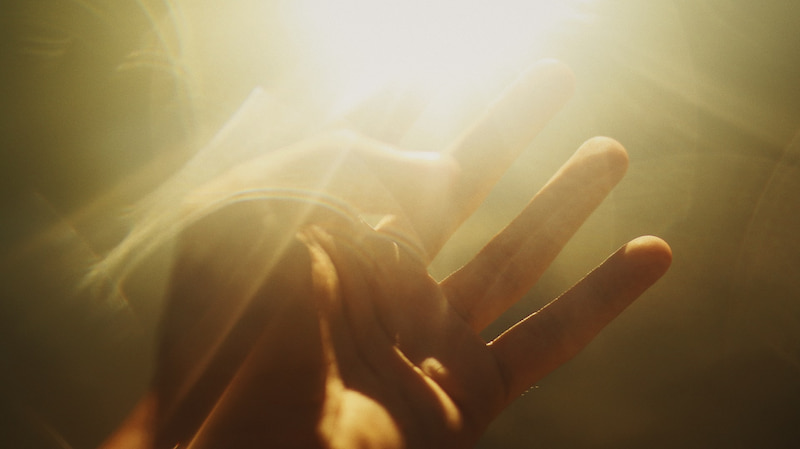
Non-duality is an eastern philosophical and spiritual teaching that suggests that everything is ultimately One, and that dualities such as “self/other,” “light/dark,” “subject/object,” are ultimately constructs of the mind.
Furthermore, the self that we take ourselves to be – the “I” – is actually an illusion based on a misunderstanding of who we truly are at a fundamental level.
I’m not saying that non-duality as a philosophy and path will be beneficial to you – but for me personally, it has helped me to see that the separate self, the ego, is at the root of suffering. And unlike religious teachings that divide the world into “us/them” “good/evil” and so on, non-duality encourages a non-judgmental approach to life in which we see the underlying unity and Oneness beneath all beings.
Non-duality is also a path that is said to open a doorway to freedom from suffering via Self-Realization or spiritual illumination.
If you’d like to explore this topic more, you can see my article on Non-Duality.
Other Practices That Have Helped:
- Meditation
- Artistic self-expression
- Exploring inner archetypes
- Balancing the root and sacral chakra
- Working with a trauma-informed therapist
- Learning basic self-care
- Learning how to set personal boundaries
- Prayer (it doesn’t have to be religious!)
There are many other practices (this whole website is a resource open for your benefit), but these are some that come to mind. And I hope they are of help to you.
***
Religious trauma is underrepresented and isn’t as explored or covered as I’d hope it to be – hence the need for this article.
I hope you know now that (1) religious trauma is valid, (2) what you’re experiencing is normal and you’re not alone, (3) there is a way through this pain, and (4) religious trauma can actually be a doorway to a deep inner path of spiritual awakening.
What has your experience with religious trauma been like? If you feel comfortable with sharing, you’re welcome to do so in the comments below.
Two paths to inner transformation – here’s how I can help you go deeper:
1. The Soul Work Compass Course: Feeling lost or stuck in repetitive cycles of pain? The Soul Work Compass Course is your guide to reclaiming your true purpose. In this deep yet practical journey, you’ll learn how to heal core wounds and create a tangible "Soul's Compass" to navigate life with clarity. Enroll now and find your True North!
2. The Inner Work Journal Bundle: Ready for deep transformation? This bundle includes three powerful journals – Self-Love, Inner Child, and Shadow Work – with 150+ prompts to heal wounds, integrate your darkness, and experience bone-deep change. Digital & printable. Print unlimited times.

 $3
$3
Well, Aletheia, I guess I was lucky in the draw of parents. Neither parent was particularly religious, and never made demands on their children to go to church. My mother was a luke-warm (at best) 7th Day Adventist. No religious or spiritual curiosity whatever from either parent. I dabbled in Jehovah’s Witnesses at the proddings from my then wife at about age 25. I’ve always had an easy time of reading people, and the Witnesses were an open book to me.
I’m 75yo, been on this ‘path’ since 1980 (33yo). I spent lots of time in the local library any time I had an hour or two to spare, searching for, what? I didn’t really know. An inner drive kept pushing me, always searching. I joined the Rosicrucian Society for about 3 years, attaining the 11th or 12th degree, can’t recall which.
But one thing bothered me about those lessons I was learning, specifically something they stated, that there is no good nor is there bad, it just is. I could see where that could be taken to the extreme, and with what I know now about the gatekeepers (CABAL) of this world, it’s exactly what they want us to believe. That was the end of my relationship with AMORC, as they like to call themselves. Sounds a lot like Aleister Crowley and his alley cat moral compass: “Do what thou wilt”.
I can only guess at the trauma you went through, and I hope your recovery is going well. It does sound like it is. But I think there’s a reason for it.
Think of it as catalyst. Without catalyst, very little change happens to us humans if we are otherwise fat and happy. It’s how the Universe (GOD or Source if you will) herds His children at times. We as a species had become too complacent. So, how to change that? Catalyst.
Love and light
Hi Ken,
Yes, I can see how the idea proposed by the AMORC that there’s no good and no bad can be an issue when acted from on an egocentric level. Thank you for sharing your experiences. And I do like what you say about these types of painful religious traumas being “catalysts,” which is certainly how I see them after having the space of 10+ years to process them. Pearls can only be formed from grit after all.
Much love 💜
Kudos to Ken for describing his journey and sharing the wisdom he has developed. I have been an active and grateful member of the Rosicrucian Order, AMORC for many years so respectfully I’d like to address what he stated about the Order’s views on good and bad. I don’t speak for the Order, but seek from my own perspective to prevent any misconceptions.
Our instruction materials do not assert or suggest that there is no good or bad. On the contrary they explicitly define “good” as words and deeds that contribute to the well-being of others, and “bad” or “evil” as anything that jeopardizes such well-being. Incidentally physical things like cellphones or baseball bats aren’t inherently good or bad. We reserve those terms to describe our conscious behavior.
The discussion proceeds from there. As humans our collective challenge is to discern such good from bad so that we can consistently do good. Sometimes it’s obvious and universal–thou shalt not kill, steal, lie, etc.–but realistically our determination is subject to our individual moods, opinions, upbringing, and culture, which can be fallible. As Rosicrucians and Mystics we strive to sharpen our reasoning, heed our conscience, and honor the Divine so that we may be conduits of good in the world.
Philosophy, morality, ethics, and human nature are necessarily nuanced. Ken evidently perceived something in our teaching he didn’t agree with and that’s fine. I wish him well and hope his search continues to be fruitful.
I invite anyone who’s interested to seek out more information about AMORC and judge for yourself. Indeed the Order’s English home page for Australia and Asia amorc.org.au provides a particularly eloquent introduction. It’s my sincerest wish that you see what I see. That is, while the means and methods differ, fundamentally the goals of Lonerwolf and AMORC are the same: to encourage individual Spiritual Awakening in the service of Humanity. That’s why I enjoy the posts and community here so much.
Peace Profound!
I was raised in a sister church. One teaching that I was taught is “sinful thinking is sinning.” Even a passing thought would send me to burn in hell for eternity. I was to repent for my sins, and for causing others to sin. Being a female caused men to have sinful desires and therefore I was sinning by existing. Thee was no way out I was always headed straight to hell. Also after the age of accountability (12) I no longer had the protection of my mother’s faith. Brutal on the mental health of a child, and I still fight SI.
That sounded so rough, Jan. I’m sorry to hear that you went through such suffering. I had similar indoctrination in regards to sinful thoughts and I think it led to a lot of intrusive thinking OCD that I went through for a few years, which was a special kind of hell in and of itself. I truly hope you can heal in every possible way from these wounds and know how worthy and lovable you are just for simply existing. 💗
Great job in writing with diplomacy, sensitivity & vulnerability!
And, well, me too; approximately 50 years of patriarchal religious programming/trauma.
And, approximately five years now living in my Truth. Ahhhh! It’s extraordinary. No longer being preoccupied by fear or guilt or angst.
My challenge is a tiny one that I would like your assistance with: how to respectfully decline/ respond to those well-meaning religious folks who keep trying to “save my soul”? (And, oh my Goddess, I used to be one of those perverse irritants!)
Thank you Bette, I appreciate your compliment about my approach, that was indeed my intention to write with sensitivity, vulnerability, and diplomacy. The world has enough us versus them thinking as it is.
How wonderful that you are now living your internal truth! Isn’t it just liberating?
As for responding to well-meaning religious folks, I’m definitely not a poster child in appropriately responding to such people. I still get bursts of internal rage when even hearing a preacher on television. I guess there are a variety of ways you could respond: with dark humor (this is inflammatory, but it can sometimes be fun, e.g., “my soul is already burning in hell, but thanks 😈”), with a good-natured response (“I’ll respectfully agree to disagree with you”), or simply ignoring the comment.
Give ’em a spin and see what happens. Feel free to report back :)
I spent 28yrs in a similar church culture, then found a psychospiritual path out. I’m now a counsellor, and I’d say more than half of the people I’ve worked with have some degree of religious trauma. Some very serious.
At it’s core, I see religious trauma’s most damaging aspect as ‘disconnection from self’. My healing and growth has come from being with those who see and believe in my innate human/spiritual essence and worth. And from spiritual leaders/role models (like Aletheia and Mateo) who help us peel back the layers to reconnect with, and nurture, our ‘inner gurus’. Unlike many religions, these are leaders who don’t seek obedient followers, but authentic and liberated souls,
Thank you for the insight, courage and vulnerability to write this article Aletheia, and for all the work you both do!
Thank you Alex, it was a pleasure to gain a little window into your own world and experience with this type of trauma. It’s so wonderful that you managed to find a way out and are now working as a counselor to help others reconnect with Self. I bet the pain you’ve experienced has really served as fuel for the fire. Much love 💗
Big hugs to you, Alethea! I too was raised Church of Christ. I decided before I entered my junior year of high school that if christian doctrine was true, the lord of the universe was a tyrant, and I would burn in hell forever before I would ever bend the knee to a tyrant! More than fifty years later, that is still my battle cry! lol. That winter of my junior year, an ancestral deity called me — Tiw (As in Tuesday), also known as Tyr. And I feel like I’ve the luckiest life in the world because of that! And yes, there is layer after layer of religious trauma to unpeel, but I love the journey.
Tyrant indeed. I greatly admire your freethinking and freespirited nature Elaine! Big hugs 🤗
‘Can you think of any more examples [of religious abuse]? If so, share them in the comments!’
Childhood indoctrination is a form of religious abuse. Teaching children outlandish beliefs as truths before they’ve reached the age of reason is not only unfair, it’s downright unethical. Children should be encouraged to ask questions and receive truthful answers or be encouraged to seek them freely as they mature. The world will never know true religious freedom until childhood indoctrination ends.
Are you familiar with Dr. Lissa Rankin? I see a lot of similarities in your experience and approach to writing on these sensitive topics like she does.
Thanks for sharing a vulnerable part of yourself for the greater good.
What you write is so quotable I’m going to requote it below just for the heck of it and for special impact for anyone reading through these comments:
So, so, so true. I could not have said it better myself.
Thanks for the recommendation and for opening up here. ❤️
Thank you for this article and sharing your personal story. So many of us have suffered shame and guilt related to religious trauma. I am so glad to see people willing to share their stories and validate the experiences of others.This is how we heal the world-by acknowledging our whole selves and healing so we can help each other. We all have beautiful, healing energy within us.🌻
Thank you Karla, I appreciate that. And yes, vulnerability and open and respectful dialogue can be tremendously healing 💜
I wish I could read the whole article at once. But i can’t. Somehow it’s to heavy. I will try again later.
I thought I was trough a lot of it. Especially after reading a part of the celestine prophecy, it made so much sense, and i felt relieved after reading that part, it was a true eye opener. The sense of conflict about religion my whole life was right! This is what was indoctrinated, but I never experienced it that way. For example, the voice of god during/after prayer. Never heard.
And there it was, described in a book.
Yet there are things that still grip me. The clothes, being bullied at school for choices that weren’t mine, being called a whore at home as a teenage girl. Never was there affection, no arm, shoulder, or hug to be comforted. Because that was bad, that wasn’t right. All things that leave their mark, even now. Not to mention the indoctrination about physical intimacy in a relationship. I think that causes the biggest problem in my adult life. The fear of not being able to enter into a healthy relationship, and to keep the relationship healthy, not being able to fulfill. Being alone all the time breaks me down, i would like to find a partner, these are the things where i would question if i am good enough? Somewhere inside i know I should be.
It’s totally fine to not read all of this article if you can’t, Evelien. The fact that you stopped and listened to your needs was a sign that you practiced self-care and self-love, which is a wonderful thing.
When I read through your comment, it struck me deeply as I could sense the deep pain and suffering you’ve been through, and are still going through. There’s a part of me, perhaps the inner child, that wants to reach out to your own inner child and reassure her that she was not responsible for the abuse inflicted upon her. How could she be? She was an innocent child that deserved all the love, affection, validation, and support that a parent or caregiver should have given. It wasn’t your fault and you aren’t to blame in any way for what happened. Please know this.
It is my deep prayer that you find all the healing possible. So much love to you 💗
Thank you so much for your kind words! It made me feel heard and understood. The article did me more than I expected. For some of the subjects in the list I would not have expected a religious background, but rather growing up under a narcissistic parent. I managed to read the article by now, again all kinds of suffering surfaced. A few months ago I would have seen that as a relapse, right now I can see it as an opportunity to process it better than I use to do. Since I started with the self love journal it has become easier for me to write off worries /suffering in a ‘journal’. I am happy and grateful that I am comfortable with that now, and can continue to use this to express myself in the future.
I feel that I have achieved more with the self love journal in the past few months than with the expensively paid therapists in the past. I have noticed that general mental health therapists have little knowledge of both the religious suffering and the narcissistic suffering. And that makes websites like this extra important! It is important to be able to discuss (and learn about) these topics (safely), perhaps only among fellow sufferers because you can understand each other. I think it’s very brave of you to write this article. And just like so many other people write I want to thank you!! For all that you do.
Beautiful article, thank you for sharing. I didn’t experience Religious trauma directly until late in life when I discovered I’m a Lesbian. While I was accepted in my family, a few made it clear their religious beliefs. We are in touch, but there’s an underlying energy that feels hateful to me. Deep Love to you & Sol along with all beautiful spirits this article resonates with.
It sucks that you can sense that underlying hateful energy, Teresa. I’m sorry to hear that you’ve had to experience this. I hope regardless of that you can feel proud in who you are and were born to be. Much love 💖
How do you feel about the Bible?